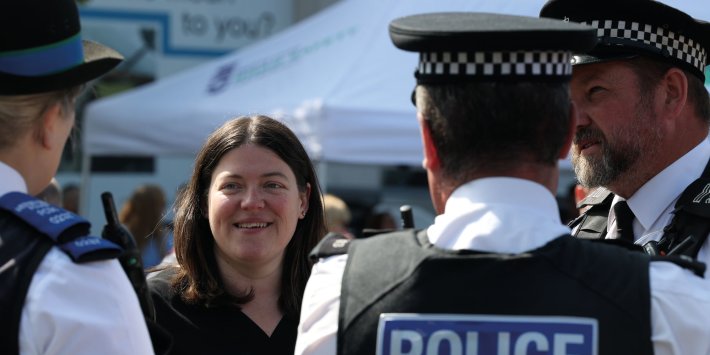
Emily Spurrell, Labour chair of the Association of Police and Crime Commissioners, with police officers
8 min read
Labour’s chief police and crime commissioner Emily Spurrell tells Sienna Rodgers the money allocated to policing ‘isn’t going to go far enough’ and warns against slashing back-office staff
In the fraught process of the Treasury negotiating with each department to finalise the comprehensive spending review (CSR), the Home Office was the final holdout: Yvette Cooper fixed a deal just two days before the funding plans were unveiled at the despatch box.
But unlike Housing Secretary Angela Rayner, who also reached a deal late, the Home Secretary’s department was still seen as somewhat of a loser in the settlement. It now faces a real-terms cut of 1.7 per cent over the rest of this parliament.
The money announced in the CSR will probably barely cover any pay inflation
Although Rachel Reeves announced that police spending power in particular would increase by 2.3 per cent a year on average, police chiefs were no happier as they argued forces would struggle to meet the government’s ambitious targets.
Does the Labour chair of the Association of Police and Crime Commissioners (APCC) agree with them?
“I do,” Emily Spurrell tells The House. “I obviously welcome the increase that we did get. I recognise it was above inflation, and we have had some commitments around neighbourhood policing, which I’ve really welcomed.
“But I think when you look at what we know so far, in terms of what was announced from the CSR, from everything I’ve seen, it isn’t going to go far enough. We know that police forces are having to make some really significant savings, and the money announced in the CSR will probably barely cover any pay inflation.”
There will be “really difficult challenges”, Spurrell warns, both in terms of meeting the government’s aim to halve violence against women and girls (VAWG) in 10 years and its commitment to neighbourhood policing, and simply in “trying to keep business as usual going”.
“As PCCs [police and crime commissioners], we absolutely agree with all of [those aims]… But we do need the influx of cash to be able to raise the game and support some of that work. So yes, I think it is going to be really difficult in the years to come.”
Asked about the likelihood of the government halving VAWG – which she says will be measured against the Crime Survey for England and Wales rather than police reporting figures – she says it is “obviously going to come down to the investment”.
“The pressure on resources is going to be a challenge, so we’ll have to wait and see what investment is going to go into tackling this. As I say, it’s not just policing, it’s education, it’s health, perpetrator programmes, it’s a whole suite of things that I think we need to tackle it. So, until we see some of that detail, it’s probably hard to say.”
Spurrell says the parts of policing most vulnerable to cuts will vary between forces based on local considerations, but raises the alarm over the potential impact on the workforce and – by extension – police presence.
“There is a real challenge around the way that the funding is currently delivered. A lot of it is ringfenced for police officers, which is important, because we know the public really value having police officers in their communities…
“But what it does mean is that where police forces are looking to have to make savings, the pressure falls on police staff and PCSOs [police community support officers]. They’re a really fundamental part of a police workforce – the people who answer the phones, do the investigations, do your procurement, do your HR.
“These are really important elements of a police force, and if you cut all of that, you are going to end up with officers potentially doing those jobs and not necessarily being out in the streets.”
Manchester-born Spurrell, 37, comes at her role from a campaigning background; after studying politics at Leeds, where she became an activist and “found her voice” on VAWG, she was campaigns manager at Liverpool students’ union while serving as a Liverpool councillor. “My life is basically the M62 – Manchester, Leeds and Liverpool,” she says.
A PCC since 2021 in Merseyside, following Labour’s success at ballot boxes in July she took over from her Conservative predecessor in September to become chair of the APCC. The organisation brings together all PCCs, police fire and crime commissioners, and deputy mayors with responsibility for policing in England and Wales.
Spurrell will now represent them while the government undertakes policing landscape reforms, pitched as a strategic reset in the relationship between government and policing. A white paper is expected in mid-July. Cooper has already announced a new National Centre of Policing to harness technology and forensics, and a Police Performance Unit to track data and drive up standards – both of which represent further centralisation.
“For me, it’s all about making sure you’ve got what we refer to as tripartite governance – you’ve got your Home Office, you’ve got your chiefs, and you’ve also got PCCs at the table,” says Spurrell. “Whatever is happening at a local level, we want to be able to feed that in, to shape what decisions are made by this national centre.”
The Home Secretary is not known to be a fan of PCCs – in fact, as shadow home secretary in 2014, she pledged to scrap them. A well-placed source says she has long been interested in their abolition, but it is seen as too politically difficult. This government is, however, pursuing devolution reforms that will see a set of PCC areas merged into the mayoral model in 2026 – and it is conceivable they could all be phased out in this way.
When Labour mayors including Andy Burnham backed this idea last year, Spurrell’s Tory predecessor Donna Jones said it would be a “retrograde step”. But asked whether she is worried about Cooper scrapping PCCs, the current APCC chair appears remarkably relaxed – pointing out that the organisation she heads also represents the deputy mayors with PCC powers.
“I don’t see it as a threat, because I think that role will have to exist in some form. There is real value in having someone directly elected, but there’s lots of value and lots of benefits to being more connected into the mayoral or combined authority model,” she says.
“As long as you’ve got somebody who’s really clearly focused on that police transparency, police accountability, the voice of the public, bringing that into policing locally, I think that’s the important bit.”
We have to be very careful not to try and demonise one community because we’ve seen a number of perpetrators from that community
So, when a PCC role is absorbed by a mayoralty, does it work as well?
“I think having a directly elected PCC has real value, because you are a very public figure, whereas deputy mayors probably have less of a public profile, because that obviously is held by the mayor,” Spurrell replies.
“But I also know that when I talk to deputy mayor colleagues who are part of a bigger system, who maybe are more in touch with other services, they can maybe draw on funding for youth services; or because they’re part of a slightly bigger structure, there are benefits to what they can do.”
One of the major reforms some police officers would like to see enacted is the 43 forces being replaced by a regional force structure, as the former is seen as outdated and untenable. Again, this move was backed by Labour under Ed Miliband. But Spurrell does not take a view on the idea and says it is unlikely to be implemented.
“It’s not something that’s being discussed at the minute,” she says, adding that “changing police boundaries is incredibly expensive, incredibly complicated”.
Spurrell also rejects calls – made by the Conservative Party and police chiefs including the head of Greater Manchester Police – to scrap the recording of non-crime hate incidents.
“We need to not be knee-jerk about it. There are people on both sides who are trying to politicise it, which is really unhelpful,” she says. “I personally think it is right that we should record some of these things.” But is it using up police resources too much? “The recording of non-crime hate incidents is not going to be the reason why policing might not be doing the basics,” Spurrell argues.
Asked about the Casey report on ‘grooming gangs’, the APCC chair suggests she is worried about some of the reaction. Responding to the suggestion made by some that a focus on ‘community relations’ translated in practice into cover-ups, she hits back, insisting that “community relationships are important”.
“We have to be very careful not to try and demonise one community because we’ve seen a number of perpetrators from that community. And this is where I think that community relationship is important.”
She adds: “That should never come at the expense of identifying perpetrators and holding them to account.”
The debate around ‘woke’ policing, such as officers showing support for Pride by joining the marches, is something Spurrell also finds “unhelpful”.
“We know that there are communities in the past who have had very bad experiences from policing as a whole, including the LGBT community, including our Black communities. I think some of the work that’s happening now is really essential. It’s not about being woke – it’s about listening to communities. It’s about understanding their perspectives,” she says.
“I think it’s really, really integral, and actually not just for communities but internally as well. Policing is getting more diverse. It still needs to get more diverse, but it is improving, and we want our staff and officers to feel they work in an inclusive environment.”





